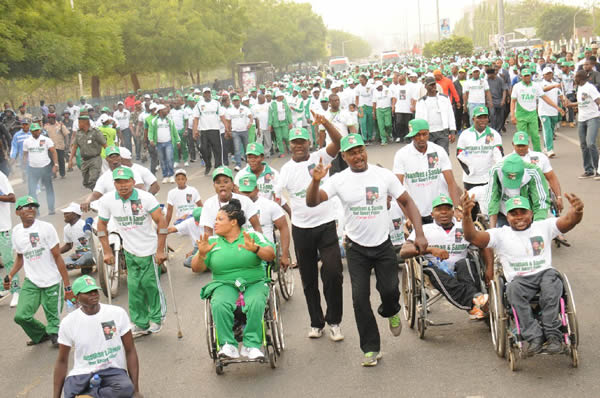Mrs Mariam Janidu, a Policy Analyst, has called on the Federal Government to encouraged People Living With Disabilities (PLWDs) to take ownership of their care.
Janidu made the call in an interview with News Agency of Nigeria (NAN), on Tuesday in Abuja.
She was speaking against the backdrop of the commemoration of International Day of People with disabilities.
NAN reports that the day is an annual event observed on Dec. 3, and put in place by the United Nation.
According to the World Health Organisation (WHO), report, about 15 per cent of the world’s population live with some form of disability.
WHO says that two per cent to four per cent of that demography experience significant difficulties in functioning.
The present global disability prevalence is higher than previous WHO estimates, which dates from the 1970s and suggested a figure of around 10 per cent.
This global estimate for disability is on the rise due to population, ageing and the rapid spread of chronic diseases, as well as improvements in the methodologies used to measure disability.
The policy analyst advised the government to prevent disease and promote equity in health and development of children and adults with, or at risk of disabilities.
“Adults with disabilities do not get enough aerobic physical activity.
“Regular physical activity is important to help them combat potentially lethal blood clots due to a genetic blood clotting disorder,” she said.
Janaidu called on the government to educate organisations and the public service on disability employment issues and how to celebrate the contributions of Nigerian workers with disabilities.
She said that with the right levels of support, people with disabilities became highly effective development workers.
“Many people with disabilities possess attributes that are actively sought in various sectors.
“They are natural problem solvers, dynamic thinkers, extremely adaptable and able to work effectively with limited resources,” she said.
The policy analyst advised that government should be inclusive of people with disabilities if they were to enable the positive social change that could benefit all members of work society.
She called on Civil Society Organisations (CSOs), and other relevant agencies to continue working alongside people with disabilities to create opportunities and pathways for them to contribute to the country’s development.
“The government should learn to mobilize volunteers with disabilities in some states and observe the transformational impact that volunteers with disabilities can have on local attitudes and knowledge.
“This will enable us to continue to build on these early experiences and engage with people with disability through dedicated disability inclusion programmes.
READ ALSO: Drug Trafficking: NDLEA Arrests 29 Suspects in Edo
According to her, the programme should be on a model that challenges perceptions by positioning people with disabilities as experts.
“It should also provide employment pathways through which people with disability can share their experience with the wider communities and across the country.
“The government should also employ these experts to provide guidance and advice across many programmes that the government can manage,” she advised.

